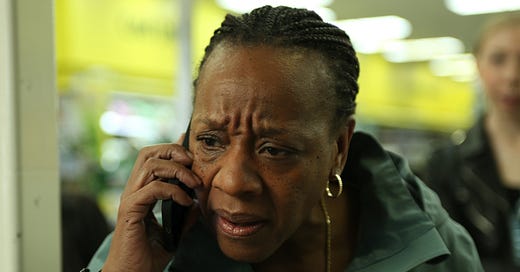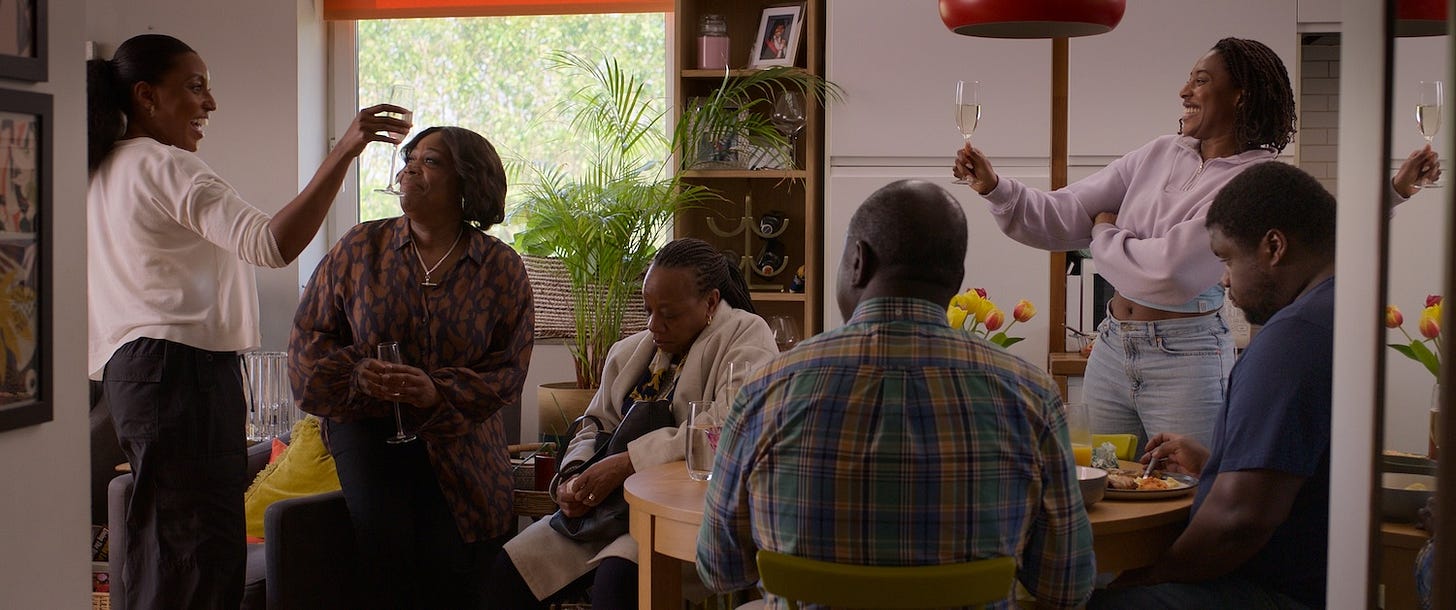As the troubled Pansy, Marianne Jean-Baptiste scores the greatest acting performance of 2024
Hard Truths (2024)
In theaters
The stateliness of this movie lays down the pathway to its dark heart, but as it opens there’s no telling where it’s going. Its urban-bucolic setting, in a hushed middle-class London neighborhood, is picturesquely “stable”. The street we’re on, lined with neat rows of two-story dwellings, doesn’t give any hint of disquiet.
We’re outside the home of Curtley Deacon (David Webber), a prosperous plumbing contractor. Once his assistant Virgil (Jonathan Livingstone) arrives, Curtley climbs into the driver’s seat of the enormous van they use for work.
Virgil tidily stows his bike in the back of the van, joins Curtley in the cab, and the two men drive off into their workday. Routine and orderliness seem to send them on their way.
Upstairs, however, Curtley’s wife Pansy (Marianne Jean-Baptiste), awakes with a shriek, shaken and trembling after a terrifying dream. After she parts the drapes to allow in a sliver of sunlight, she realizes she’s “safe”, but can’t stop breathing heavily, her eyes wide with fear.
Writer-director Mike Leigh cannily lights only one side of Pansy’s face, so we see one eye wide with terror and half her mouth stiff with fright. It’s a visual warning about what we’re in for. Beholding a woman at war with herself.
Also, visually, Leigh understands that we’re not ready to face Pansy full-on yet. She fearfully peers out the window to see pigeons cooing on the balcony, and frowns as if they were invaders.
They haven’t disturbed her peace. They’ve reminded her that she has none.
Pansy is an example of those cases renegade British psychologist R.D. Laing diagnosed in his famous book The Divided Self.
One side of Pansy, the woman angry for reasons she can’t explain, bellows and roars in order to keep her other side — her other self — hidden. That’s the woman wracked with decades-deep pain.
So, the anger continues, directed helter-skelter, while the unacknowledged agony churns on underneath, never letting Pansy rest. “I'm so tired,” she repeatedly says to herself and to others, not even hoping to be understood. “I just want it all to stop.”
Before we can get to see a Pansy possibly freed from her pain, writer-director Mike Leigh wants us to recognize those like Pansy all around us. And, perhaps with even greater reluctance, see the Pansy inside ourselves. She’s the unforgiving, caustic scourge we all can become.
But it doesn’t. So, she’s an equal opportunity insulter. Shoppers in line at a grocery store, a clerk in a furniture store, a man asking if she’s about to move her car so he can have the space — all feel her wrath, with no idea of what’s eating this furious woman.
A young doctor, a dentist, volunteers soliciting for charities on the street, none of them mollify Pansy or calm her fury.
Curtley and their drifting, gentle 22-year-old son Moses (Tuwaine Barrett), who lives at home, bear the daily brunt of Pansy’s outbursts. For Pansy, neither of them is tidy enough, thoughtful enough or solicitous enough of her incessant physical and mental pain.
So, she emotionally abuses them, the only way she can devise to reach them. The silence in the house, built up over decades, is lethal. The family is dissolving and none of them know how to stop the leaking.
Pansy’s patient hairdresser sister Chantelle (r.) tries to heal her sister’s wounded soul
Pansy’s best hope is her devoted younger sister Chantelle (Michele Austin, in a lovely, deeply sensitive performance), a sweet-natured beautician with two bright, striving adult daughters.
Aleisha (Sophia Brown) is a paralegal and Kayla (Ani Nelson) works for a corporate skincare company. These three share a giddy warmth that Pansy and her family can’t even imagine.
Chantelle hopes for a breakthrough by asking Pansy to go with her on Mother’s Day to leave flowers at the grave of Pearl, their single mother who died five years ago.
Pansy is in no mood to memorialize Pearl, who while the girls were still young went to work after their father left. And stuck Pansy with rearing Chantelle. Pearl the survivor never ceased finding fault with Pansy, who was actually holding the family together.
Pansy’s bitterness has endured, and it explodes at the gravesite. “Why can’t you enjoy life?” the agonized Chantelle pleads with her enraged sister.
“I don’t know,” Pansy furiously replies. “Haunted . . . haunted”, she describes herself, eyeing Pearl’s gravestone, her eyes stilled in misery, welling with tears
Later the same day, over a celebratory Mother’s Day dinner at Chantelle’s apartment including Curtley, Moses and Chantelle’s daughters, Pansy won’t eat.
Pansy (c.) refuses to join in the Mother’s Day festivities with the rest of her family
Her galvanic coming apart at the dinner table is one of the greatest acting feats I’ve ever seen and is the centerpiece of a flawless portrayal. I didn’t see a better performance in all of 2024. Jean-Baptiste never lets us lose sight of Pansy’s pain because the woman herself can’t find relief or give herself solace.
With the same tenacious allegiance to the truth, Leigh refuses to provide the catharsis we all might want for Pansy.
Before we can get to see a Pansy possibly freed from her pain, Leigh wants us to recognize those like Pansy all around us. And, perhaps with even greater reluctance, see the Pansy inside ourselves. She’s the unforgiving, caustic scourge we all can become.
The actors do phenomenal work, building scenes from the smallest details to show us not only Pansy’s frightened distance from those who actually love her, but their outreach that’s constantly rebuffed.
Chantelle, Curtley and the forlorn Moses all strike deep chords of sympathy simply by portraying their hurt and anguish nakedly, without any solicitation for understanding.
That’s the tangled net Pansy has cast over everything in her life. Jean-Baptiste flings it with relentless fury, never letting up on this aching woman’s outrage, so we remember that sometimes pain can’t even be named, much less healed.
This is a sober movie and a wrenchingly truthful one. Yet even when Pansy was most cruel, I couldn’t completely cut myself off from her.
I think that’s because Leigh and Jean-Baptiste don’t compromise the edgy story with any neat epiphany. Pansy will likely wake up tomorrow screaming. And so, I understood as the lights came up, could I.







Compelling review, sensitively written, but not certain that I want to share the character's trauma.